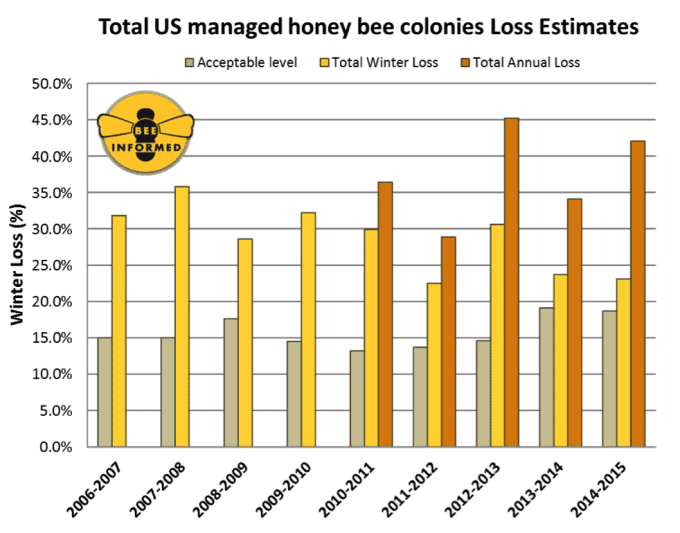14
May
With Second Highest Honey Bee Losses, Congressional Hearing Ignores Pesticide Effects
(Beyond Pesticides, May 14, 2015) For the first time on record, summer losses of managed honey bee colonies have exceeded winter losses, according to preliminary results of the annual survey released yesterday by the Bee Informed Partnership, the U.S. Department of Agriculture (USDA) and the Apiary Inspectors of America. This is the second highest annual loss recorded to date: beekeepers lost a total of 42.1 percent of the number of colonies managed over the last year (total annual loss, between April 2014 and April 2015), which is up from 34.2 percent for the previous year. On the same day that this survey was released, the U.S. House Agriculture Subcommittee on Horticulture, Biotechnology and Research held a hearing on pollinator health, but failed to advance policy solutions that would protect pollinators from the unnecessary use of pesticides.
“What we’re seeing with this bee problem is just a loud signal that there’s some bad things happening with our agro-ecosystems,” Keith Delaplane, PhD at the University of Georgia and one of the co-authors of the study told Phys.Org. “We just happen to notice it with the honeybee because they are so easy to count.”
About two-thirds of the beekeepers responding to the survey report losses greater than the 18.7 percent level that beekeepers say is economically acceptable. This underlines the seriousness of the health problems stressing honey bees in this country, according to Jeff Pettis, a survey co-author and a senior entomologist at USDA’s Agricultural Research Service Bee Research Laboratory in Beltsville, Maryland. More than 6,100 beekeepers across the country who manage almost 400,000 colonies in during October 2014, representing nearly 15.5 percent of the country’s 2.74 million colonies, responded to the survey.
“We traditionally thought of winter losses as a more important indicator of health, because surviving the cold winter months is a crucial test for any bee colony,” said Dennis van Engelsdorp, Ph.D., an assistant professor of entomology at the University of Maryland and project director for the Bee Informed Partnership. “But we now know that summer loss rates are significant too. This is especially so for commercial beekeepers, who are now losing more colonies in the summertime compared to the winter. Years ago, this was unheard of.”
Federal Inaction
Yesterday’s Congressional hearing was slated to focus on pollinator health, however it failed to address the impacts of systemic pesticides, like neonicotinoids (neonics), on bees, birds and other pollinators and the lack of a coordinated federal response to pollinator declines. Instead, the hearing questioned federal disagreement over the value of neonicotinoid-coated seeds for farmers, despite recent findings which demonstrate that neonic-coated seeds fail to increase yields or provide protection from target pests during critical times of plant activity.
“EPA has already found that neonic-treated soybean seeds are not providing our nation’s farmers any added benefit,” said Nichelle Harriott, science and regulatory director at Beyond Pesticides. “In light of safer alternative options, Congress should be directing USDA and EPA to encourage farmers to get off the toxic treadmill and return to more sustainable agricultural practices.”
Last week, Beyond Pesticides along with a diverse group of environmentalists, beekeepers, and advocates, sent a letter to the USDA Inspector General and the co-chairs of the White House Task Force on Pollinator Health this Tuesday, urging a thorough investigation into recent reports that USDA scientists are being harassed and censored. The letter expresses particular concern over the suppression of research related to bee-killing neonicotinoid insecticides and glyphosate, a key ingredient in Monsanto’s Roundup, which has been linked to cancer. The White House Task Force on Pollinator Health, co-chaired by USDA, is expected to release a plan on bee protection in the near future; however the more than 25 groups, which include farmers, fisheries, and food safety advocates, are concerned that the plan will lack meaningful protections if USDA’s research has been compromised.
To date, USDA has released funds for pollinator habitat, the Council on Environmental Quality has released new guidelines for creating pollinator habitat around federal buildings and the Fish and Wildlife Service has banned the use of neonic pesticides on National Wildlife Refuges. On April 2, the EPA announced a moratorium on new or expanded uses of neonicotinoids while it evaluates the risks posed to pollinators. However, EPA has failed to take any action on the hundreds of approved neonicotinoid products already on the market. Advocates say a sensible response to the continuing decline of pollinators must address the use of neonic pesticides, and encourage the development of least-toxic and organic alternatives. In agriculture, for home pest control, landscape care, and in nurseries, there are effective and economic organic techniques can that be successfully employed.
An extensive overview of major studies showing the effects of neonics on pollinator health can be found on Beyond Pesticides’ What the Science Shows webpage.
A complete analysis of the survey data will be published later this year. The abstract for the analysis is at http://beeinformed.org/results-categories/winter-loss-2014-2015/.
Source: USDA ARS Press Release
All unattributed positions and opinions in this piece are those of Beyond Pesticides.











this needs a petition to sign so it can be sent to the idiot congressman get a clue… Dont kill the bee this will kill the people!
May 22nd, 2015 at 1:18 amSave the bees! Stop the pesticides! Stop Monsanto!
May 22nd, 2015 at 8:58 amban neonics and all pesticides, this is critical, and stopping Monsanto and Dow is highest priority or our survival, too…
July 19th, 2015 at 1:06 pmWith the Honey Bee die-off, food production as we know it will fall catastrophically and no amount of chemical additives or genetic engineering (that profit only the unconscionable corporations) can reverse that dire result.
July 19th, 2015 at 4:00 pm